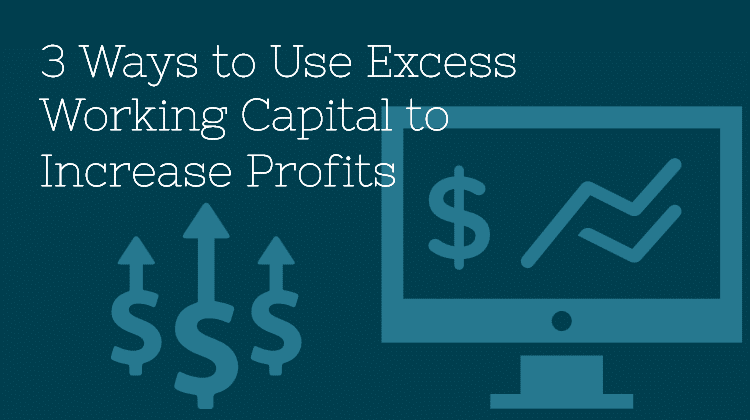
Many companies struggle to find ways to improve working capital, but others find themselves in the opposite position. They’re sitting on excess working capital.
If your company is sitting on large amounts of cash, you’re missing opportunities! That money could be reinvested into the company to improve profits and shareholder value. During an economic downturn, having extra cash on hand can help the company stay solvent until the economy improves. Even reinvesting that cash into short-term interest-earning accounts is a better option than simply sitting on that cash where it can’t work for the company.
Believe it or not, too much working capital can cause problems for your business. For example, excess working capital typically means that one or more of your company’s current asset accounts is too high. Excess working capital can also indicate abnormally high accounts receivables, which could be a very big problem for the company if customers don’t pay. Furthermore, too much working capital could be a sign that a company is holding too much inventory. If that inventory isn’t sold, the company could be in trouble
Given all of these potential problems that excess working capital could cause, following are ways your company can better use its excess working capital to increase profits and shareholder value.
1. Reinvest Cash
If your company has a large amount of money in cash and cash equivalents, then that money should be invested back into the company through interest bearing investments, new product development, expansions, or even stock dividends.
The opportunity cost of sitting on that cash is too great. The money could actually be helping to grow the company, increase sales, and improve shareholder wealth. When it sits on the balance sheet, it does nothing for the company and can cause management to become complacent.
2. Reduce Accounts Receivable
When accounts receivable are abnormally high, it is likely that customers are not paying invoices in a timely manner. If accounts receivable cannot be reduced and customers continue not to pay, the company won’t have the cash on hand to pay its bills each day.
Therefore, you must work with your distributors and collections team (if you have one) to improve the timeliness of customer payments. This might also require a review of credit risk and credit terms as well as re-negotiating contracts with distributors.
Reducing accounts receivable will give the company more cash on hand, not just to pay expenses but also to fund new profit-generating operations and increase shareholder value.
3. Reduce Inventory
Companies that sit on large quantities of inventory are sitting on a lot of money that could be used to pay daily bills and fund operations. Management should identify and adhere to optimum inventory levels.
Implementing a just-in-time operations strategy can help to ensure that inventory levels don’t exceed the optimum amount. The reduction in inventory frees up cash for the company to reinvest in new products, expansions, and other activities that increase profits and shareholder value.
How do you use your excess working capital to increase profits and build your company? Leave a comment below and share your thoughts and experiences.





For many businesses, inventory is the single most expensive investment they hold. It has become more and more common that a business will tie half of [if not more] its total capital in to inventory. Unfortunately in today’s economy, carrying too much inventory has proven to be a burden for most companies. It needs to be understood, that inventory is directly correlated with cost and risk: the larger the inventory, the larger the cost and risk. Today, we will discuss how your goods turn in to excess inventory and how your excess inventory is costing you money every day.
:” the larger the inventory, the larger the cost and risk” is not always right.the large inventory you have, the more control of the market as well as the opportunity to make money when others don’t have enough inventory when the sales seasons are coming.